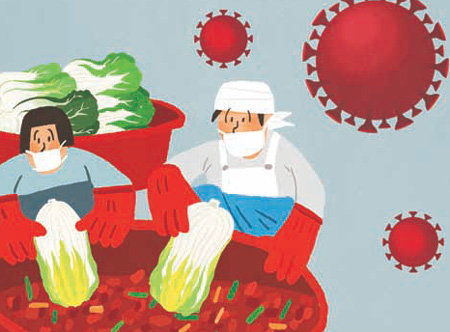Kimchi protects against COVID-19, a study says
Kimchi protects against COVID-19, a study says
Posted July. 17, 2020 07:45,
Updated July. 17, 2020 07:45

Recent study has pointed to kimchi for low COVID-19 fatality rates of South Korea. According to the British newspaper The Sun, Dr. Jean Bousquet, honorary professor of Pulmonary Medicine at Montpellier University, France, and his team studied a link between low fatalities and national dietary differences and found that countries where fermented cabbage forms a key part of their diet have had lower fatalities.
Fermented cabbage helps decrease levels of ACE2, an enzyme in the cell membrane mostly found in lungs that is used by COVID-19 as an entry point into the body. Consuming high levels of fermented cabbage brings down the number of ACE2, making it more difficult for the virus to enter the body. High in antioxidants, fermented cabbage is also good for boosting immunity.
The research team also paid attention to Germany’s sauerkraut, which is finely cut cabbage fermented in salt and often served with sausages.
The cumulative confirmed cases in South Korea and Germany stood at 13,612 and 201,252 as of Thursday, respectively, with only 291 and 9,148 deaths which translate to death rates of 2.14 percent and 4.55 percent. Fatalities were much higher in countries where fermented cabbage is not a staple diet such as Italy (14.37 percent), Spain (9.33 percent) and the United Kingdom (15.43 percent).
The study also found that nations that consume a lot of yoghurt or caviar, such as Greece, Bulgaria and Turkey, have also experienced low death rates.
“Little attention has been given to the spread and severity of the virus, and regional differences in diet, but diet changes may be of great benefit,” said Dr. Jean Bousquet, advising people to include fermented vegetables in their breakfast.
Dr. Jean Bousquet is an expert who chaired The Global Alliance against Respiratory Diseases, a research institution under the World Health Organization. The research has been published in the international journal “Clinical and Translational Allergy.”
Youn-Jong Kim zozo@donga.com







